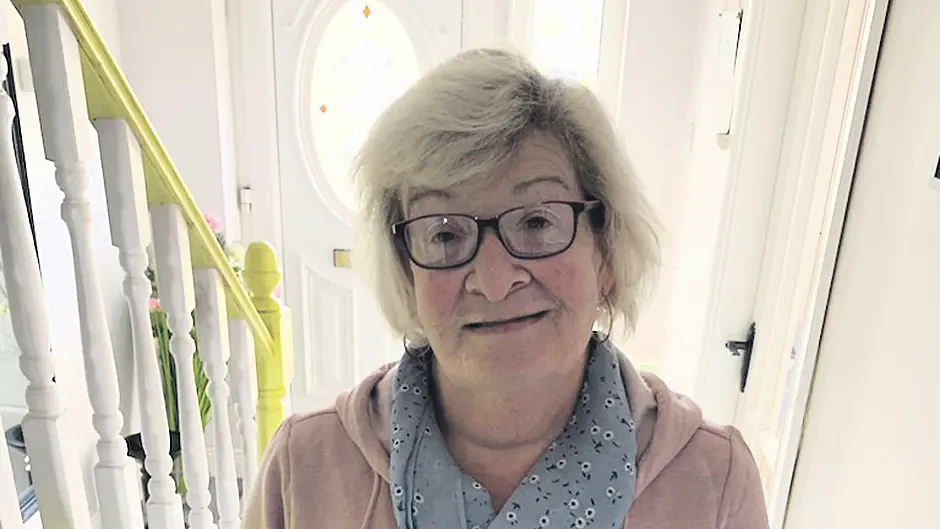Bandon woman Mags Smith, who lost her sight at the age of 46, has a stark message for the Government to tackle long ophthalmology waiting lists before others find themselves in her position
A BANDON woman who went blind overnight is adding her voice to urgent calls for the government to tackle waiting lists for ophthalmology appointments.
Outpatient waiting list figures have averaged at 42,000 people annually since 2018.
And while nothing could have been done to help Mags Smith, knowing the heartache of losing your sight, she says if others can be helped, it’s imperative there are no delays.
A former clerical officer with Teagasc, happily married to Timoleague man Eric and very involved in her community, she was president of Bandon Junior Chamber, the first female secretary of Bandon Rugby club, and played a key role in various committees in her home town.
However, everything changed dramatically when at the age of 46 she went blind.
Working in an office in Bandon at the time, she remembers: ‘It was a typical Tuesday morning, I drove to work and that was the last time sitting behind the wheel. It was the start of me losing my independence. I could not see anything on the computer screen, could not tell the keys on the keyboard, could not use the calculator, switchboard, everything was becoming foggy in front of me.
‘My immediate reaction was to ring my optician, was it something to do with my glasses? Sitting in the optician’s chair that afternoon having an eye test, I failed to see any letter on the chart. Was she going to sort it out today? Did I need new glasses? Would an antibiotic sort this? She had no answers! No diagnosis! I was referred to the eye clinic in CUH. Panic did not set in immediately. I had to attend on a daily basis for a week at the eye clinic for a series of tests. Going home each evening I felt sure that things would get back to normal.’
Sadly Margaret was forced to adjust to a ‘new normal’ as she was diagnosed with a condition called Lebers Optic Atrophy which had caused a gradual deterioration in the nerves in her eyes, so gradual she hadn’t noticed, until as she said, ‘that switch was flicked.’
‘It was horrific and my life really became one of two halves – before and after losing my sight,’ said Margaret, now aged 60.
‘Coming home that day from the eye clinic I felt afraid for what lay ahead. I felt like I had lost my main ingredient in life, my independence.
‘I tried my best to get on with things but my confidence disappeared. I could not recognise people only greeting people if I recognised their voice. The only solution to this I thought was to stay at home and only venture out when it was absolutely necessary. Acceptance of my condition at this stage was not on my radar.’
Feeling very afraid and overwhelmed Margaret, turned to alcohol to help her forget what was happening.
‘At home all day alcohol became my best friend, it helped me not to have to face up to anything. But slowly I realised I now had two major problems,’ she said.
With the support of her husband, family and GP, Mags gave up alcohol and has been sober now for 10 years.
‘I also made that all important phone call National Council for the Blind of Ireland (NCBI) and have never looked back (pardon the pun). Today slowly but surely my independence is becoming part of my life again.’
Mags uses technology to help with many everyday tasks such as texting, emailing etc, she has a talking watch and a long white cane she calls Daisy.
‘I remember the first time I ventured out on my own. Eric was terrified but I’m a determined person and knew I had to do it. I went as far as Wilton on the bus, walked around the shopping centre and even bought myself a top! That was a big thing for me to do alone and my confidence grew.
‘But I do still find that people act strangely towards visually impaired people.
‘They are unsure how to react, sometimes I feel we are a nuisance. I often feel shy now in situations where I wouldn’t have before.
‘So far my disability has brought many ups and downs eg broken nose, broken kneecap when I was out walking, but with recovery it also brought more determination. I now attend Bfit Gym three times weekly for personal training sessions, staff make sure sight loss is not an obstacle and I lead a very busy life.
‘Some daily tasks still bring frustration, and there can be bad days, but with the help of NCBI, family and friends now a smile comes more often than a tear to my face!
‘This summer I plan to walk the Waterford Greenway, and next year hopefully I will walk part of the Camino. Life is great.’
Diagnosis delays can cause unnecessary blindness
THE number of patients seeking ophthalmology appointments has risen steadily over three years and this is not a consequence of appointments being cancelled due to Covid-19.
That’s according to June Tinsley, National Council for the Blind of Ireland (NCBI)’s head of advocacy and communications who said: ‘The longer the delay in diagnosis, assessment and treatment the worse the condition becomes leading to unnecessary blindness in some cases. This in turn delays the referrals to NCBI who can offer holistic support to enable the patient to adjust to sight loss.’
Outpatient waiting list figures have averaged at 42,000 people annually since 2018 and worryingly 16,727 people are now waiting longer than 18 months up from 8,168 in 2018.
The NCBI have called for the recruitment of more consultant ophthalmologists. Secondly, they want to expand the eye clinic liaison officer (ECLO) service to all acute hospitals nationwide, including CUH.
The service bridges the gap between clinician interventions and offering information, support and referral to patients in a holistic way.
If such a position existed at the time of Mags’ diagnosis, she would have forged a link with the NCBI earlier on her journey.








